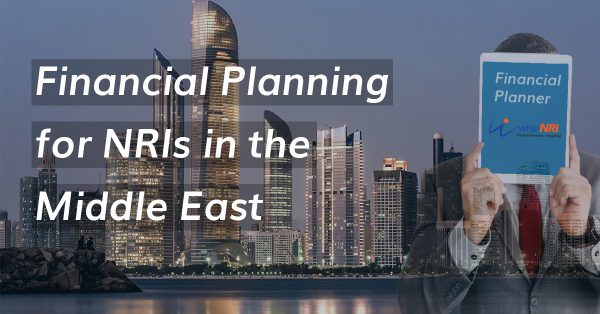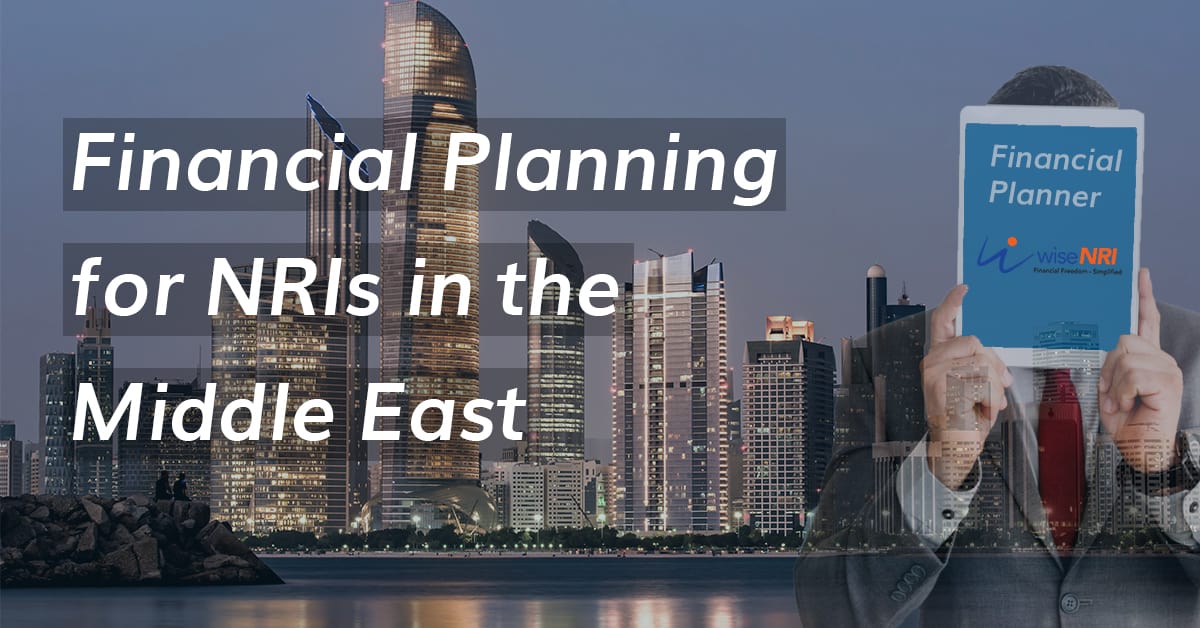The purpose of anyone’s income is not to earn money or to collect items. The purpose is to be independent, live a meaningful life, and achieve life goals. To reach those goals, we need to make a plan. And as the plan involves money over long periods, it is a financial plan.
Thus, the ultimate purpose of financial planning is to design and implement strategies to help you manage money matters. With this roadmap, you can reach your goals safer and hopefully quicker.

As per the latest estimates by the United Nations, more than 16.6 million Indians were living outside their country of birth. In fact, despite being the second-most populous country for many decades, India has the largest diaspora community in the world.
Of the 16.6 million Indian diasporas, the Middle East accounts for a lion’s share at more than 30 percent or close to 5 million NRIs. This is the largest group of NRIs in any single region. It is twice as many as in the United States which has the second-largest NRI community in the world.
The incomes, standard of living, aspirations, lifestyle, and expenses in the Middle East countries are very different from those in India. Therefore, financial planning for NRIs in the Middle East could not be the same as those for resident Indians.
This is not to say that some golden rules of financial planning would not apply to them. The basic tenets of financial planning would remain the same – for example, spend less than you earn, invest than spend, and do not get into a debt trap.
Why does living in the Middle East Make Sense for NRIs?
- Many NRIs’ children are studying in European countries or the USA. Being in the Middle East brings them closer. For those whose children are studying in the region itself, it is a no-brainer.
- These countries are not far from India too, making travel to and from India easy and economical.
- The Middle East as a block has superb infrastructure, with some of the cities like Dubai, Riyadh, and Jeddah, regularly featuring in the top cosmopolitan cities of the world.
- Most countries are adopting a more progressive stance toward liberal practices and the residents are the beneficiaries of such policies.
- The standard of living in the Middle East is way higher than that in India.
- The Indian community makes up one of the largest parts of the expat population in the Middle East. In some countries or pockets, they are the largest ethnic group or community. So, you will never feel away from home.
- Many NRIs have set up businesses and eateries in the Middle East. You can enjoy Indian culture and palates locally.
- The nominal tax rates result in higher savings, higher disposable income, a better lifestyle, and more investments.
- The systems and institutions are responsive, well structured, and eager to help residents in all matters. Higher adoption of technology makes the processes quick, streamlined, and transparent.
- The cost and terms of retirement are more favourable and economical compared to the US, the UK, and even Singapore.
Common Goals for NRIs in the Middle East
It is to state the obvious that details always matter while drawing up a financial plan. As we make a financial plan for an individual, no two plans even for people living almost identical lives could be the same. And the lives of people in the Middle East are nothing like that of anyone in India.
Some peculiarities make financial planning for NRIs in the Middle East more complicated.
Children’s Education
Every parent spends hours every week strategizing on how to get their children into the finest educational institutions.
To help your child achieve their dreams, you must first find out what they wish to become, where they wish to study, and how much is it going to cost you. It may happen that the education for their areas of interest is not available in the Middle East. Then you must look for colleges in the USA, Europe, or some other destination including India.
If your children are going to study in a school and later in a college in the Middle East, the education expenses are comparable to that of the USA or Europe. Even in this case, the Middle East would be much more closer to these destinations which is a big advantage for NRIs living there.
To ensure that you have funds to sponsor their educational requirements requires you to draw a thoughtful financial plan. You can start by estimating the fund they may need for future study and investing wisely.
Read:: Child Higher Education – Things NRIs Should Consider
Safety Net – Insurance
Risk management and mitigation are important parts of any financial plan. Most NRIs living in the Middle East are already covered by medical insurance from their employers. But for someone with plans to stay there, additional medical cover is a must.
Similarly, as the living expenses are higher in the Middle East, your term insurance must account for them. Judging by the Indian context, if you think that having a 2 or 4-crore term insurance is adequate, then you are in for a rude shock.
As we have discussed in our earlier post, many Indians get tricked into buying expensive insurance plans from Zurich and Friends Provident.
Plan their Residence
Dubai seems to be the best place to live and spend life. But it is one of the most expensive cities in the world. While you are working there, your company may foot the bill for your residence and living expenses.
But there are many other less expensive, and yet as open and progressive cities like Dubai, in the Middle East where you can plan your residence. The most obvious choices are Riyadh, Jeddah, Qatar, Abu Dhabi, Doha, Muscat, and Amman.
Taxation
Taxation is a fact of life. Until a few years ago, there was zero taxation in most Middle East countries. They used to reap rich dividends of the Petro Dollars and subsidize most of the social and civic amenities for their citizens.
Even on expatriates, including NRIs, the marginal rate of tax was minimal to nil in most jurisdictions.
But, for the last few years, especially after the 2008 financial crisis and the recent COVID oil shock – coupled with the adoption of cleaner energy & transport options – have forced these countries to start taxing their citizens. Still, the tax rates in most of the developed countries in the Middle East are nothing compared to India.
But it goes on to reinforce our point-of-view that we stated in the beginning. Plan your taxes, use all legal options to save taxes, optimize your income structure to reduce tax incidence, and take benefit of the DTAA that India has with all these countries.
Retirement and Estate Planning
If you also plan to spend your retirement in the Middle East, you need to start investing in it right now. As there would be no active income, but the lifestyle expense would be more in the Middle East, you need to invest far more aggressively than usual.
You can take advantage of the special customized retirement packages launched by city-states like Dubai.
In the ‘Retire in Dubai’ scheme expats over 55 are eligible for a five-year renewable visa if they meet the following criteria:
- Monthly income of 20,000 dirhams (around USD 5,500).
- Financial savings of 1 million dirhams (around USD 280,000).
OR
- You own a property in Dubai worth 2 million dirhams (around USD 560,000).
The retirees must also get personal health coverage and will not be covered by the benefits from the federal or local governments.
In estate planning, for your property situated in Middle East countries some of the laws that apply there may interfere with your estate planning. In most cases, the desires of the deceased is a registered WILL are respected.
But, if the property is intestate, then the local laws may apply, and your rightful heir may not get what they deserved.
You can set up a trust to own most of your properties in the Middle East making (adult) family members its trustees with external professional help.
Culture and Food
Compared to the European and the US culture, the Middle East would feel closer to home. Also, as many Indians from almost all states live there, you are almost living in many little Indians.
People from all over who live there enjoy Indian festivals and are particularly fond of Indian cuisine.

The Right Financial Plan for the Middle East
A qualified financial planner, who has adequate exposure to the nuances of the Middle East can help you draw an optimal financial plan.
The financial planner must be able to understand our aspirations as an NRIs living in the Middle East with higher aspirations. If they look at your goals with a prism for Indian clients, then they will do you a disservice.
But that does not mean that they should be oblivious of Indian realities. As an NRI, you would have lifelong, even longer financial ties with India, so a thorough understanding of Indian tax and other relevant laws is also necessary.
Having two different financial planners – one for your Middle East properties and one for the Indian ones – is not a good idea. In such case, one would not get a wholistic picture and may also give you confusing advice.
Check – How Financial Planning for NRIs is different.
In Conclusion
Benjamin Franklin rightly said, “if you don’t plan you are planning to fail.” If you want to attain your financial goals at the proper time in your life, you need a financial plan.
A solid financial plan would help you manage your affairs smoothly – in India or the Middle East. It will ultimately help you achieve goals, no matter if they are expressed in Dinars or Dirhams, instead of Rupees.


Can you check my income tax returns that will be filed in India and give your opinion about it?